Courses in Learning Disability & ADHD for Teachers
University Courses in Alberta
A number of Alberta universities offer post-graduate degree programs that specifically relate to teaching neurodivergent students. Check with your desired university for their MEd program selections.
Additionally, the University of Calgary offers a Graduate Certificate in Learning Disabilities: Learning Disabilities in the Classroom or the Graduate Certificate: Educational Neuroscience: Applications for Teaching and Learning
The University of Alberta offers a Graduate Certificate in Educational Studies: Structured Literacy and Reading Science
- credits applicable to further education
- facilitated training during specified times or based on trainer availability
- accompanying workbooks
- costs in $CAD, $US, Euros, or be free!
- time zones different from local time
- certificates of completion
- life-time access to materials/videos with registration
Please read each online course selection carefully to determine what exactly is being offered and which of the considerations listed above apply.
Science of Reading Series: Turning Theory into Practice
- Learn what the Science of Reading tells us about how the brain learns to read, and how to apply this knowledge to your classroom.
- Offered by the Learning Disabilities Association of Alberta
- Learn how to use the Reading Readiness Screening Tool and then how to implement effective intervention strategies based on Structured Literacy.
- Offered by the Learning Disabilities Association of Alberta
Basics of Decoding and Spelling Instruction
- The Basics of Decoding and Spelling Instruction course is a 15h online, on-demand course that provides instruction on how to teach decoding and spelling so that all students can learn to read and spell.
- Offered by the International Dyslexia Association (IDA) Ontario
Pathways to Proficient Reading
- Introduction to the Science of Reading and reading strategies.
- There are also courses for school leaders to learn how to implement the Science of Reading in their schools or districts.
- Courses are accredited by the International Dyslexia Association (IDA).
- Offered by AIM Institute for Learning & Research
The Orton-Gillingham Approach to Structured Literacy
Wilson Language Training®
- Both offered by AIM Institute for Learning & Research
The Reading Teacher’s Top 10 Tools
- Developed by Dr. Deb Glaser, Top 10 Tools is an online comprehensive reading course designed to immerse educators in the science of reading, including research and practical applications in the classroom. This course is aligned with IDA Knowledge and Practice Standards (KPS).
- Offered by Tools 4 Reading
Improving Reading for Older Students
- Grade 4 to High School for English Language Arts, Literacy and ELL teachers.
- Offered by Achieve the Core
- 9 separate courses
- Offered by The Reading League Online Academy
- 9 modules by Dr. Sally Shaywitz
- Offered by Coursera
Pathways to Proficient Writing
- Effective instructional practices that will benefit all students, including linguistically diverse populations and those with or at risk for language-based learning disabilities.
- Offered by AIM Institute for Learning & Research
Self-Regulated Strategy Development (SRSD)
- Supported by decades of research, this is a “best evidence-based, classroom-proven writing method helping all level of K-12 and college entry students excel at writing and learning.” It was originally developed for students with Learning Disabilities.
- Offered by SRSD Writing to Learn
- A different pedagogical approach, suitable to all grades, for structuring math instruction in such a way as to gain “…general improvement in mathematics performance including computational fluency, conceptual understanding and problem solving…”, both in the short-term but also in the long-term.
- Offered through a collaborative partnership with the Werklund School of Education at the University of Calgary.
Concrete–Representational–Abstract (CRA) Approach to Mathematics Instruction
- This approach is best intended for elementary but also applicable to secondary grades.
- Offered by LD@School a project of the Learning Disabilities Association of Ontario (LDAO)
Intensive Intervention in Mathematics Course Content
- This course provides learners with an opportunity to extend their understanding of intensive instruction through in-depth exposure to data-based individualization (DBI) in mathematics complete with exemplars from actual classroom teachers.
- Offered by the National Centre on Intensive Intervention
- Learning Disabilities (LD) is so much more than a list of strategies. This course will explore current research of the brain-based underpinnings and cognitive functioning of LD to increase your understanding of the Why and How of strategies to increase student success With a solid understanding of these two factors, strategies are more successful.
- Our self-led online course, Inside ADHD for Educators, takes you inside the world of Attention-Deficit/Hyperactivity Disorder (ADHD) at school, one module at a time. This 10-module course has been designed for professionals who work with or plan to work with students with ADHD. Our mission is to increase knowledge, skills, and abilities to maximize teacher and student success.
- This is a condensed and targeted 8 hour version of the Inside ADHD for Educators course. It covers the key aspects of setting students with ADHD up for success in school and beyond.
These courses are offered by Foothills Academy Community Services.
Teaching: Effective Literacy Instruction
Science of Reading
What Is the Science of Reading?
Mark Seidenberg (2021): “The Science of Reading” is a body of basic research in developmental psychology, educational psychology, cognitive science, and cognitive neuroscience on reading, one of the most complex human behaviours, and its biological (neural, genetic) bases. This research has been conducted for decades in the US and around the world. The research has important implications for helping children to succeed, but it has not been incorporated into how teachers are trained for the job or how children are taught. The Science of Reading is not just “phonics”. It is about all of the types of knowledge that underlie skilled reading and how they are learned.”
Research on how people learn to read has been well established for decades. The scientific evidence refutes the idea that learning to read is a natural process (unlike learning to speak which is a natural process), and is of such magnitude that Stanovich (1994) wrote:
“That direct instruction in alphabetic coding facilitates early reading acquisition is one of the most well established conclusions in all of behavioural science. . . . The idea that learning to read is just like learning to speak is accepted by no responsible linguist, psychologist, or cognitive scientist in the research community.”
What Neuroscience Tells Us: Reading is an Acquired Skill
Video: The Reading Brain (a great introduction)
frontal lobe
front
back
Cervelet
parietal lobe
word analysis,
sound-symbol
connection
letter/ word
recognition
language
comprehension
speech sounds
(input & output)
occipital
lobe
temporal lobe






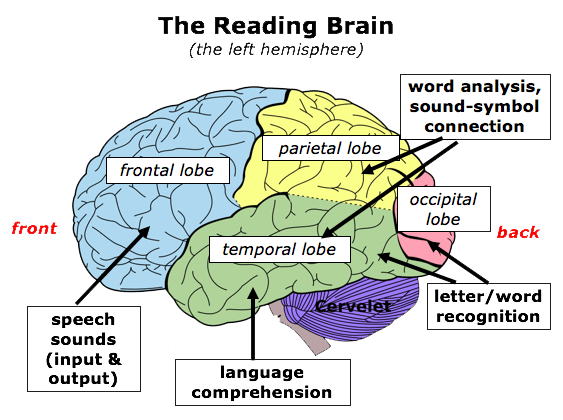
Dehaene’s Videos & Other Resources: (Videos are well worth watching!)
The Brain Prize (2016) Video
How the Brain Learns to Read (2013) Video
The Massive Impact of Literacy on the Brain and its Consequences for Education (2011) Article
National Reading Report – the 5 Pillars of Literacy
Following a comprehensive review of the research on the science of reading, the 2000 National Reading Panel Report stated that students need explicit instruction in the essential components of reading: phonological awareness, phonics, fluency, vocabulary, and reading comprehension.
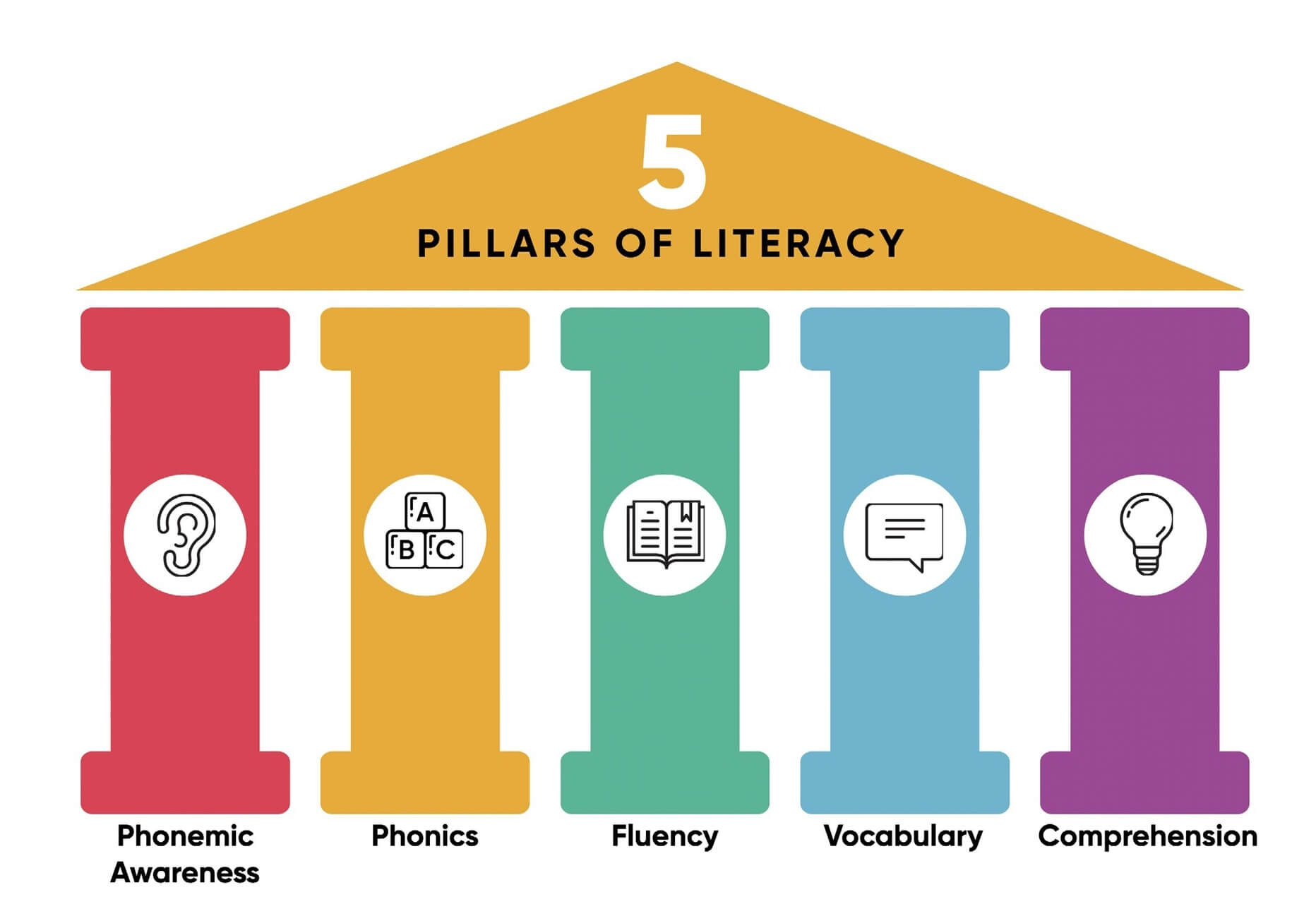
5
PILLERS OF LITERACY
5
PILLERS OF LITERACY

Phonemic Awareness

Phonics

Fluency

Vocabulary

Comprehension
Simple View of Reading

The Simple View of Reading
Decoding
Ability to apply sound-symbol relationships to read words
X
Language Comprehension
Ability to understand spoken language
=
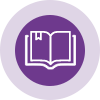
Reading Comprehension
X
Developing strong reading comprehension requires the development of skills in two critical areas: (1) decoding words in texts accurately and automatically and (2) making sense of the language we hear and read. This is known as the Simple View of Reading.
The simple view of reading is a research-informed representation of how reading comprehension develops. It characterizes skilled reading comprehension as the ‘product’ of 2 separate but equally important ‘factors’ – word recognition skills & language comprehension ability.
- Decoding = word recognition, or skills needed to recognize words in print accurately & automatically
- Language comprehension; ability to derive meaning from written & oral language. Understanding what words, phrases, sentences, and text mean.
Video: Simple View of Reading (2 minutes)
Article written by David Kilpatrick (May, 2020): Research that Shaped the Science of Reading. The article that originally introduced the Simple View of Reading.
LEARN MORE – Science of Reading
- Reading in the Brain. the New Science of How We Read. By Stanislov Dehaene
- Language at the Speed of Sight. By Mark Seidenberg
- The Science of Reading: A Handbook 1st edition. Authors: Margaret Snowling, Charles Hulme
- Research Findings in Reading Instruction are Settled Science
By International Foundation for Effective Reading Instruction. June, 2015 - Ending the Reading Wars: Reading Acquisition from Novice to Expert.
By Anne Casteles, Kathleen Rastle, & Kate Nation. June, 2018. Published in Association of Psychological Science Journal
- At a Loss for Words; How a flawed idea is teaching millions of kids to be poor readers. By APM reports Producer: Emily Hanford
The Reading Rope
Dr. Hollis Scarborough compares skilled reading to the many strands of a rope. Each strand represents a separate skill that when combined with the others, creates a strong, proficient reader. When any one strand (skill) is not acquired with fluency, it weakens the strength of the rope. Scarborough’s model depicts each skill as a strand woven together to form either language comprehension and word recognition, and then those two woven together to form skilled reading (reading comprehension). Students must receive instruction that supports all of these skills in order to develop into a skilled reader. (Hennessey. Oct. 12, 2020) (Image credit: Scarborough, H. 2001. Connecting early langague and literacy to later reading(dis)abilities: Evidence, theory, and practice. Pp.97-100 in S.B. Neuman & D.K. Dickinson (Eds.) Handbook of Early Literacy. NY: Guidlford Press.)
Language Comprehension
Background Knowledge
Vocabulary Knowledge
Language Structures
Verbal Reasoning
Literacy Knowledge
Word Recognition
Phonological Awareness
Decoding (and Spelling)
Sight Recognition
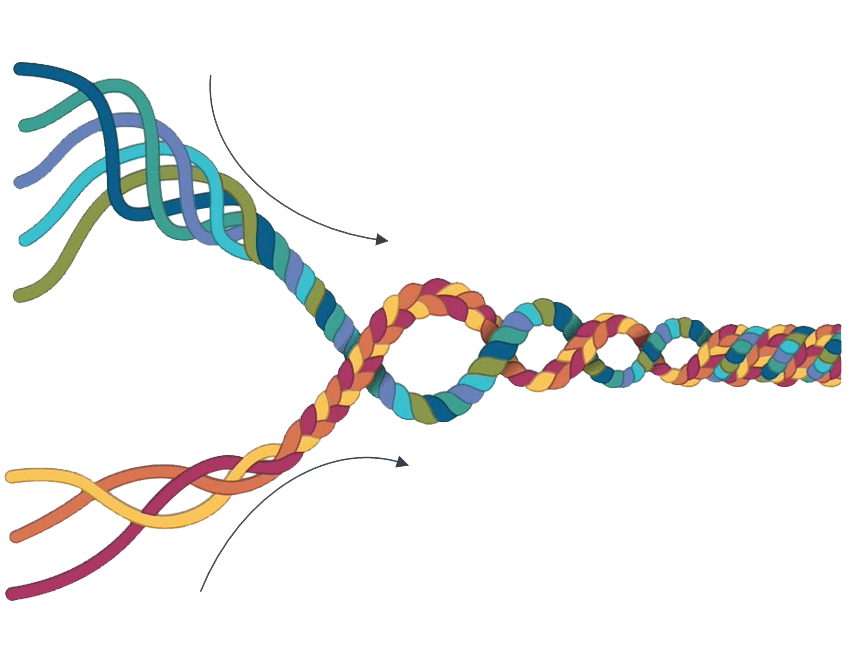
Skilled Reading
Fluent execution and
coordination of word
recognition and text
comprehension.
Increasingly
Strategic
Increasingly
Automatic
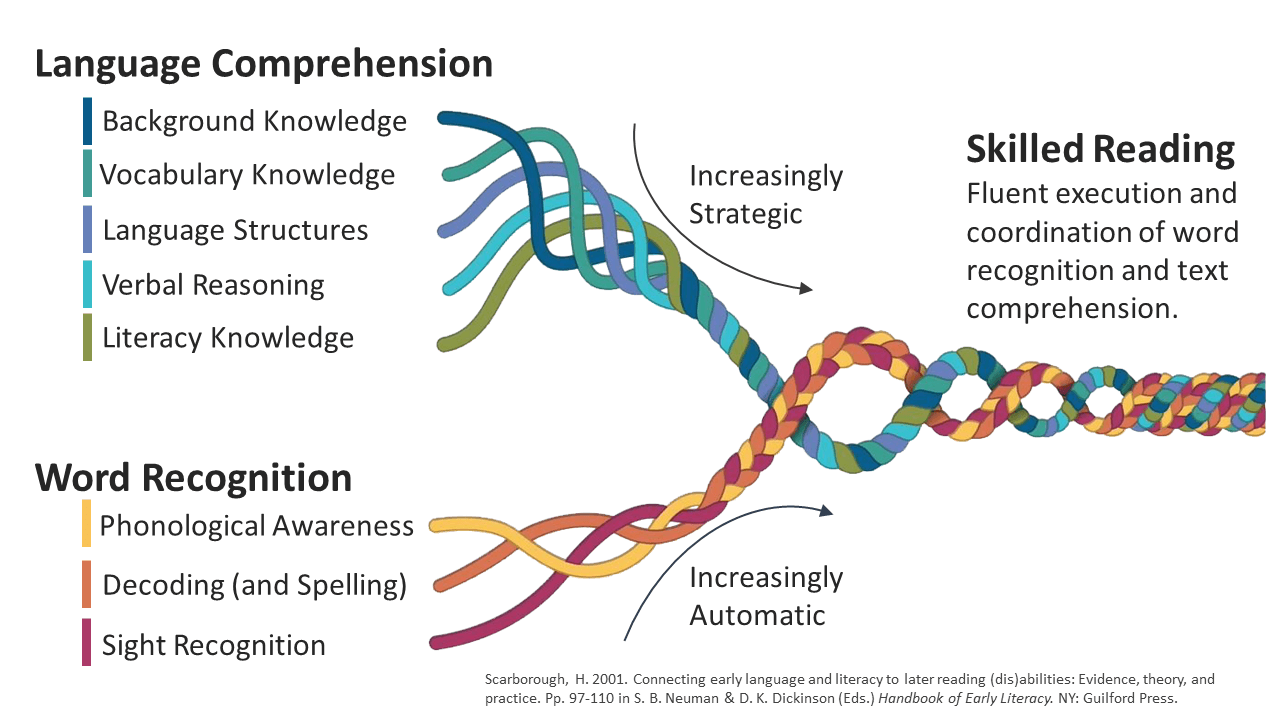
Lower Reading Rope – The Word-Recognition Strands:
Phonological awareness, decoding, and sight recognition of familiar words work together as the reader becomes accurate, fluent, and increasingly automatic with repetition and practice.
Upper Reading Rope – Language Comprehension Strands:
Once readers have mastered word recognition, the dominant factor contributing to proficient reading comprehension is language comprehension ability. This is the ability to simultaneously integrate and organize information from various language systems into a single meaningful representation.
All the strands of Scarborough’s Reading Rope are interdependent and develop over time. The lower strands require increasing automaticity; whereas, the upper strands require readers to become increasingly strategic in the use and integration of their ever-growing language abilities.
Video: Scarborough’s Reading Rope
Video: Unravelling the Reading Rope: The Multifaceted Nature of Skilled Reading. Nancy Hennessy, June 2020.
Structured Literacy
The APPLICATION of the Science of Reading into Literacy Instruction
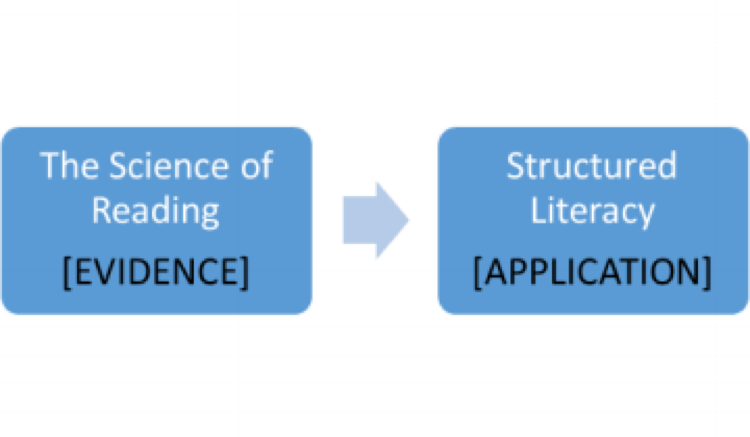
Structured Literacy: Effective Instruction for Students with Related Reading Difficulties
International Dyslexia Association article
Structured Literacy teaching stands in contrast to other approaches that are popular in many schools but that do not teach oral and written language skills in an explicit, systematic manner. Evidence is very strong that the majority of students learn to read better with structured teaching of basic language skills, but the components and methods of Structured Literacy are critical for students with reading disabilities including dyslexia.
Therefore, Structured Literacy teaching is the most effective approach for students who experience unusual difficulty learning to read and spell printed words. The term refers to both the content and methods or principles of instruction.
Structured Literacy is characterized by the provision of systematic, explicit instruction that integrates speaking, reading, and writing and emphasizes the structure of language across:
- Speech sounds (phonology)
- The writing system (orthography)
- The structure of sentences (syntax)
- The meaningful parts of words (morphology)
- The relationship among words (semantics)
- And the organization of spoken and written discourse
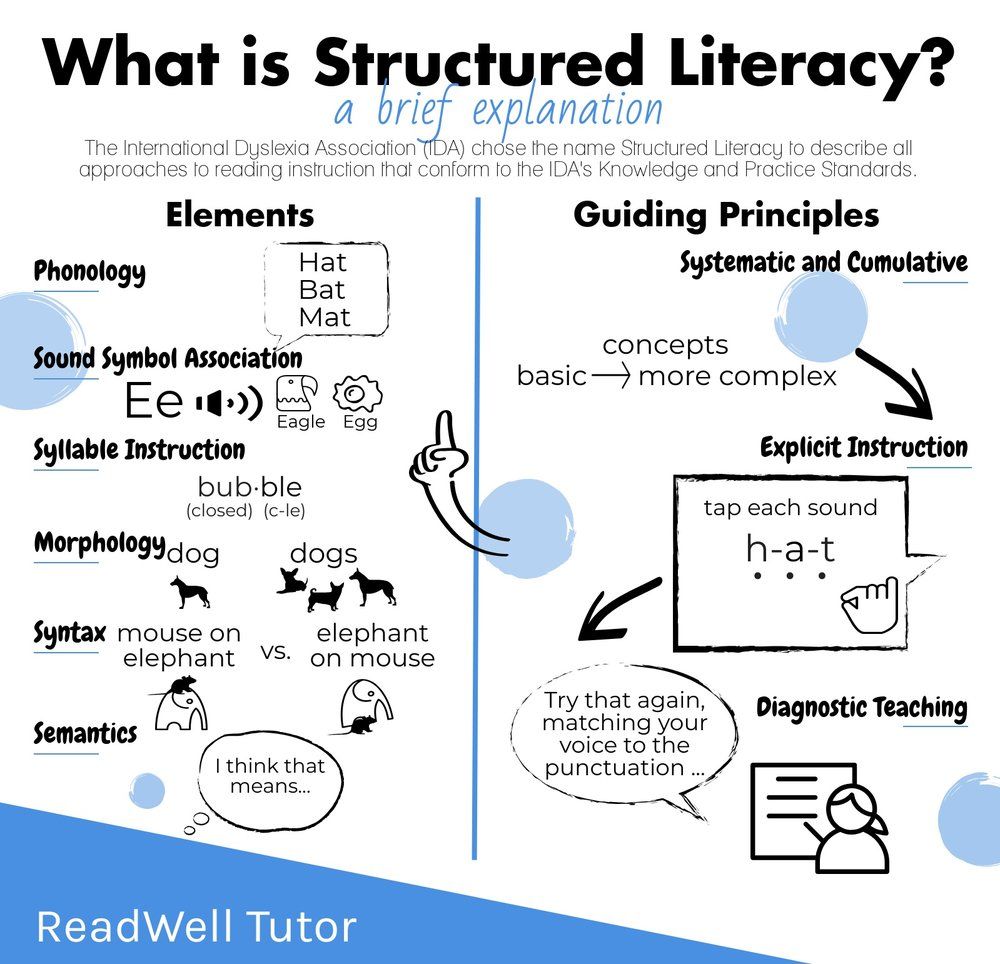
- Explicit & Direct Instruction: deliberate teaching of all concepts, with continuous student-teacher interaction.
- Systematic: the organization of the lessons and accompanying materials follows the logical order of language. The sequence begins with the easiest and most basic concepts and elements, and progresses methodically to more difficult concepts and elements.
- Cumulative: each step must be based on concepts previously learned.
- Diagnostic & Responsive: instruction is based on careful & continuous assessment.
- Hands-On, Engaging, & Multimodal: methods often include hands-on, multi-sensory learning.
- Guided Practice & Independent Practice with scaffolded learning opportunities (I Do, We Do, You Do)
Phonology (speech sounds):
Phonology is the study of the sound structures of spoken words and is a critical element of Structured Literacy instruction. Phonemic Awareness, the ability to recognize and manipulate individual phonemes (smallest speech sound) in a spoken word, has been proven to be a foundational reading skill. English as 44 phonemes.
Sound-Symbol Association:
Students must learn how to map the sounds (phonemes) to symbols or printed letters (graphemes). Students learn the alphabetic principle, and systematically learn how to decode (read) and encode (spell) words.
Syllable Instruction:
A Syllable is a unit of oral or written language with one vowel sound. Instruction includes teaching of the six basic syllable types in the English language.
Morphology (meaningful word parts):
The Structured Literacy curriculum includes the study of base words, roots, prefixes, and suffixes.
Syntax (structure of sentences):
Syntax is the set of principles that dictate the sequence and function of words in a sentence in order to convey meaning. This includes grammar, sentence variation, and the mechanics of language.
Semantics (meaning):
Semantics is that aspect of language concerned with meaning. The curriculum (from the beginning) must include instruction in the comprehension of written language, including vocabulary.
VIDEO: Focus on Structured Literacy
Watch this video for an excellent introduction to Structured Literacy by one of the experts in the field of literacy, Nancy Hennessey (8 minutes).
| Structured Literacy | Typical Literacy Approaches | |
|---|---|---|
| Initial phonics approach | Emphasizes phoneme-grapheme level approach. | Often emphasizes a larger-unit approach (e.g. word families, sight words). |
| Attention to phonemic awareness | Phonemic awareness skills such as phoneme blending and segmentation are explicitly taught. | Phonemic awareness may receive limited attention |
| Coordination of decoding and spelling instruction | Well-coordinated; beginners work on similar word patterns (e.g. CVC) in decoding and spelling. | Often not well-coordinated; focus may be on memori whole words rather than applying phonics skills. |
| Delivery of instruction | Prioritizes teacher-led, explicit, systematic instruction. | Teacher-led instruction often not a priority; students are expected to develop reading skills on their own. |
| Types of texts | Texts are coordinated with the phonics so most words are decodable to children (decodable texts). | Leveled or predictable texts are used with many words that some students often cannot decode. |
| Teacher feedback to children’s oral reading errors | Prompt teacher feedback that encourages close attention to print and application of decoding skills. | Teacher feedback may be limited and/or encourage guessing at words based on context. |

Structured Literacy is an Approach, not a Specific Program. Once you have in-depth knowledge about the Structured Literacy approach, including both the guiding principles and specific elements of instruction, you can evaluate more critically which programs and resources adhere to this scientifically proven method, and which programs are the best match for your students’ needs.
Literacy Programs that utilize a Structured Literacy Approach will incorporate:
- Principles: Explicit, Systematic & Cumulative, Diagnostic & Responsive, Hands-on, Engaging, and Multi-modal
- Explicitly & Systematically teaches word identification strategies
- Elements: Phonology, Sound-Symbol Association, Syllables, Morphology, Syntax, Semantics, Comprehension
The Reading Institute provides a comprehensive list of reading programs that use the Structured Literacy approach.
The programs listed below also align with a Structured Literacy approach. They may be used for classroom instruction (Tier 1) in grades K-Gr 3 or for Tier 2 & 3 intervention for struggling readers, including older students.
Wilson Language – Programs
*Fundations: prevention & Early Literacy Program for K-3.
*Just Words: focus on decoding and encoding for students below grade level. For students in grades 4-12 & adults
*Wilson Reading System: Intensive instruction in small groups or 1-1. For students in grades 4-12 & adults.
Wilson provides excellent teacher training and resources.
Voyager Sopris Learning
Voyager Sopris Publishing provides proven programs, high-quality professional development, and evidence-based intervention. As well as their excellent literacy programs, they also provide assessment tools and math programs. Here are some of their well-respected literacy programs:
Voyager Passport (K-5)
- Reading Intervention program for grades K-5.
- Comprehensive, explicit, & systematic instruction in the 5 essential components of reading and includes language & writing
- Remote Ready with: online teacher center, online student center, eBooks, Fluency Practice Activities, Writing Practice Activities, etc.
*Literacy! Live.
- Developed by Louisa Moats, literacy expert
- Comprehensive Literacy intervention for struggling students in Grades 5-12.
- Blended learning models, including digital platform, so good for virtual/online learning
- Reinforces literacy foundations while strategically using authentic text to engage and accelerate them to grade-level proficiency.
Literacy!
- Literacy Intervention for grades 4-12
- Very comprehensive. Covers Speaking & Listening to the English Language, Phonemic Awareness & Phonics, Word Recognition & Spelling, Vocabulary & Morphology, Grammar & Usage, Listening & Rdg. Comprehension, Speaking & Writing.
- Appropriate for classroom and RTI groupings. Differentiated learning
- Blended learning modules
- Assessments
- PD and ongoing support
Lindamood Phoneme Sequencing Program for Reading, Spelling, and Speech (LiPS)
This evidence-based program is well regarded for providing multi-sensory instruction in phonemic awareness, letter-sound correspondences, decoding/encoding. It is an effective prevention program for students in grades K-Gr. 3 and an intervention program for individuals of all ages. You will need to add other resources, such as decodable text. It does not address reading comprehension skills.
“UFLI Foundations is an explicit and systematic program that teaches students the foundational skills necessary for proficient reading. It follows a carefully developed scope and sequence designed to ensure that students systematically acquire each skill needed and learn to apply each skill with automaticity and confidence. The program is designed to be used for core instruction in the primary grades or for intervention with struggling students in any grade.”
“UFLI Foundations strikes the perfect balance between structure and responsiveness to students’ needs. The program features ample opportunities for students to practice, along with built-in gradual release. It provides teachers with detailed lesson plans, a PowerPoint slide deck to accompany each lesson, and downloadable materials for homework or center activities.”
This is a mostly free, very easy to use reading instruction program designed by the University of Florida Literacy Institute based on solid research. It comes with a great cross-referenced list of decodable texts.
Decodable texts follow a Structured Literacy Approach
- Books in the series follow a systematic scope and sequence of letter-sound correspondences.
- Systematically presents the 6 syllable types.
- Used with emerging readers and older struggling readers to develop & master phonology, sound-symbol association, morphology, and fluency.
- Some series are more thorough and provide accompanying teacher resources, lessons, and student activities. Others may not have lessons/teacher resources but are excellent for extended practice.
- List of Decodable Books/Publishers – International Dyslexia Association of Ontario list of English & French decodables; The Reading League list of decodables
A critical factor in maximizing the effectiveness of Structured Literacy instruction, regardless of the resources you use, is the depth of your teacher knowledge.
The identification of individuals with dyslexia and other reading difficulties, and appropriate instruction by a well-trained teacher using a structured approach to teaching reading, has been a cornerstone of IDA since its beginning. To ensure that teachers and specialists are appropriately trained, IDA reviews and accredits teacher training programs and began certifying individuals in 2016.
Knowledge and Practice Standards for Teachers of Reading (KPS) pdf
IDA views accreditation and certification as key strategies to change the way reading is taught in classrooms. Through accreditation and certification, IDA develops a direct line that connects teacher preparation programs to teacher competency and, in turn, to student achievement. IDA accredited programs produce highly knowledgeable and skilled teachers of reading who seek certification and positively impact reading achievement for all students.
The Center for Effective Reading Instruction requires candidates to present evidence of their having mastered the content of the KPS by earning a passing score on the Knowledge and Practice Examination of Effective Reading Instruction (K-PEERI) and for select certifications, passing scores or ratings on supervised practicum requirements.
IDA Accredited Programs are listed on CERTI
Professionals graduating from an IDA Accredited Program are prepared to earn a CERI certification. CERI recognizes IDA Accredited Programs, which have undergone a rigorous vetting process designed to ensure that program graduates have mastered core KPS-aligned knowledge and practice competencies associated with preventing reading failure and remediating off track readers- including readers at-risk for, and identified with, Dyslexia.
The International Dyslexia Association (IDA) is the best site to start your journey into learning how to apply the Structured Literacy (SL) approach into your literacy instruction and intervention.
Helpful overviews provided by IDA:
*Structured Literacy Press Ready Infographic
*Structured Literacy – An Introductory Guide (Educator Training Initiative Brief)
*IDA Dyslexia Handbook. What Every family Should Know.
There are affiliated Dyslexia Association branches around the world, including the branch in Canada, International Dyslexia Association of Ontario.
All of the branches provide resources for both families and professionals, and ongoing professional development and training opportunities. (We list upcoming PD in our Event Calendar)
Speech to Print: Language Essentials for Teachers 3rd Edition, 2020 by Louisa Moats

“For two decades, Speech to Print has been a bestselling, widely adopted textbook on explicit, high-quality literacy instruction. The highly anticipated third edition, is fully updated with ten years of new research, a complete package of supporting materials, and expanded guidance on the how of assessment and instruction in today’s classrooms.”
The Art and Science of Teaching Primary Reading by Christopher Such
 “The essential guide to the science behind reading and its practical implications for classroom teaching in primary schools.
“The essential guide to the science behind reading and its practical implications for classroom teaching in primary schools.
Teaching children to read is one of the most important tasks in primary education and classroom practice needs to be underpinned by a secure foundation of knowledge. Teachers need to know what reading entails, how children learn to read and how it can be taught effectively.
This book is an essential guide for primary teachers that explores the key technical and practical aspects of how children read with strong links to theory and how to translate this into the classroom. Bite-size chapters offer accessible research-informed ideas across all major key topics including phonics, comprehension, teaching children with reading difficulties and strategies for the classroom.”
Structured Literacy Interventions
Teaching Students with Reading Difficulties, Grades K-6 Edited by Louise Spear-Swerling

“Comprehensive and evidence-based, Structured Literacy (SL) approaches place a high value on explicit, systematic, and sequential instruction. This book brings together leading experts on key components of literacy to help K–6 teachers design and target SL interventions for particular student profiles. Chapters identify effective features of instruction for supporting phonological awareness, basic and multisyllabic word decoding, spelling, reading fluency, vocabulary, oral and reading comprehension, and written expression, especially for at-risk readers and those with disabilities.”
Shifting the Balance
6 Ways to Bring the Science of Reading into the Balanced Literacy Classroom By Jan Burkins and Kari Yates
 Your whole classroom, from resources to posters to routines to lessons you know off by heart, are centered around a balanced literacy approach. But you’ve also noticed that not all of the children in your class are learning to read, much less fluently, and you’ve heard that Balanced Literacy is on the way out. Which approach is best then? Do you have to redo everything you’ve spent years perfecting?
Your whole classroom, from resources to posters to routines to lessons you know off by heart, are centered around a balanced literacy approach. But you’ve also noticed that not all of the children in your class are learning to read, much less fluently, and you’ve heard that Balanced Literacy is on the way out. Which approach is best then? Do you have to redo everything you’ve spent years perfecting?
Authors Jan Burkins and Kari Yates address these questions as a “critical opportunity to look closely at the research, reevaluate current practices, and embrace new possibilities” to ensure that every child learns to read. This book is a great stepping stone on your way to a fully Structured Literacy classroom.
Bringing Words to Life: Robust Vocabulary Instruction ,2nd Edition, by Isabel L. Beck, Margaret G. McKeown and Linda Kucan
 “Hundreds of thousands of teachers have used this highly practical guide to help K–12 students enlarge their vocabulary and get involved in noticing, understanding, and using new words. Grounded in research, the book explains how to select words for instruction, introduce their meanings, and create engaging learning activities that promote both word knowledge and reading comprehension. The authors are trusted experts who draw on extensive experience in diverse classrooms and schools. Sample lessons and vignettes, children’s literature suggestions, “Your Turn” learning activities, and a Study Guide for teachers enhance the book’s utility as a classroom resource, professional development tool, or course text. ”
“Hundreds of thousands of teachers have used this highly practical guide to help K–12 students enlarge their vocabulary and get involved in noticing, understanding, and using new words. Grounded in research, the book explains how to select words for instruction, introduce their meanings, and create engaging learning activities that promote both word knowledge and reading comprehension. The authors are trusted experts who draw on extensive experience in diverse classrooms and schools. Sample lessons and vignettes, children’s literature suggestions, “Your Turn” learning activities, and a Study Guide for teachers enhance the book’s utility as a classroom resource, professional development tool, or course text. ”
A Fresh Look at Phonics, Grades K-2
Common Causes of Failure and 7 Ingredients for Success by Wiley Blevins

“Perfect for teachers who need: Evidence-backed principles, strategies, and activities for providing English learners in Pre-K–Grade 6 with explicit instruction on language and literacy fundamentals.
An essential text for courses on literacy foundations and biliteracy—and an ideal in-service professional development resource—this accessible book will give teachers the knowledge base they need to help English learners develop strong literacy skills and achieve academic success.”
“Comprehensive and well-written . . . provides many practical suggestions. All professionals who work with ELL students should read this book.”—Linda Siegel, Ph.D., Professor Emerita, University of British Columbia.
Learning Disabilities: From Identification to Intervention by FLetcher, Lyon, Fuchs and Barnes
 This second edition is the definitive source for teachers, administrators, and researchers on evidence-based practices for teaching academic skills to students with LDs. Its acclaimed authors provide a detailed, compelling, and nuanced picture of LDs and how to address their impact on students’ learning.”
This second edition is the definitive source for teachers, administrators, and researchers on evidence-based practices for teaching academic skills to students with LDs. Its acclaimed authors provide a detailed, compelling, and nuanced picture of LDs and how to address their impact on students’ learning.”
“There are so many books and so little time–yet this one, I assure you, is worth your precious time. Whether your primary interest is teacher training, research, or classroom practice, this book provides the knowledge you need. Building on the exemplary first edition, the second edition features current research on all domains of LDs (math, word reading, writing, reading comprehension) and expanded practical guidance for implementing research-based practices across the grade span.”
Disclaimer: The Learning Disabilities & ADHD Network does not support, endorse or recommend any specific method, treatment, product, remedial centre, program, or service provider for people with Learning Disabilities or ADHD. It does, however, endeavour to provide impartial and, to the best of our knowledge, factual information for persons with Learning Disabilities and/or ADHD.






